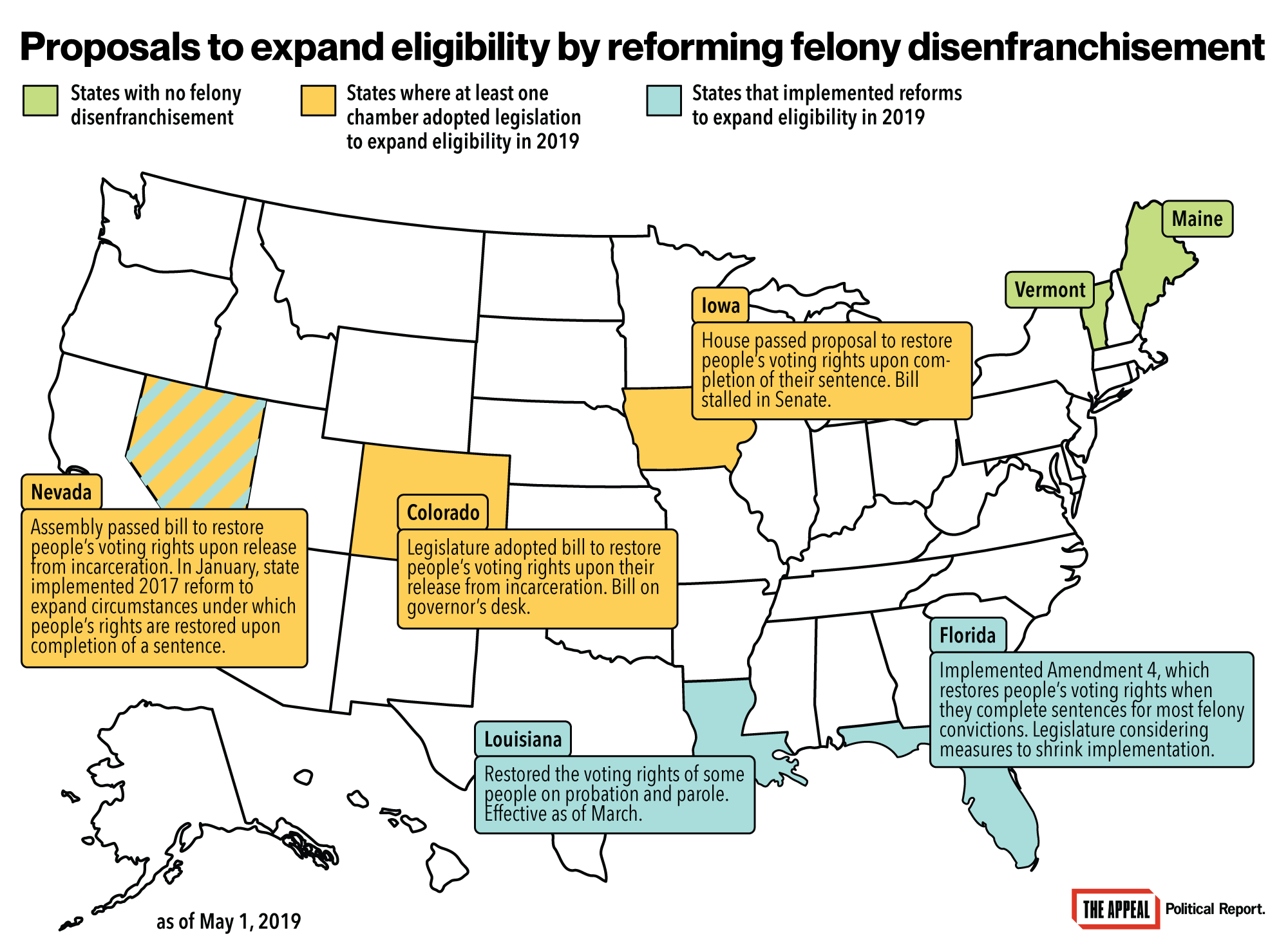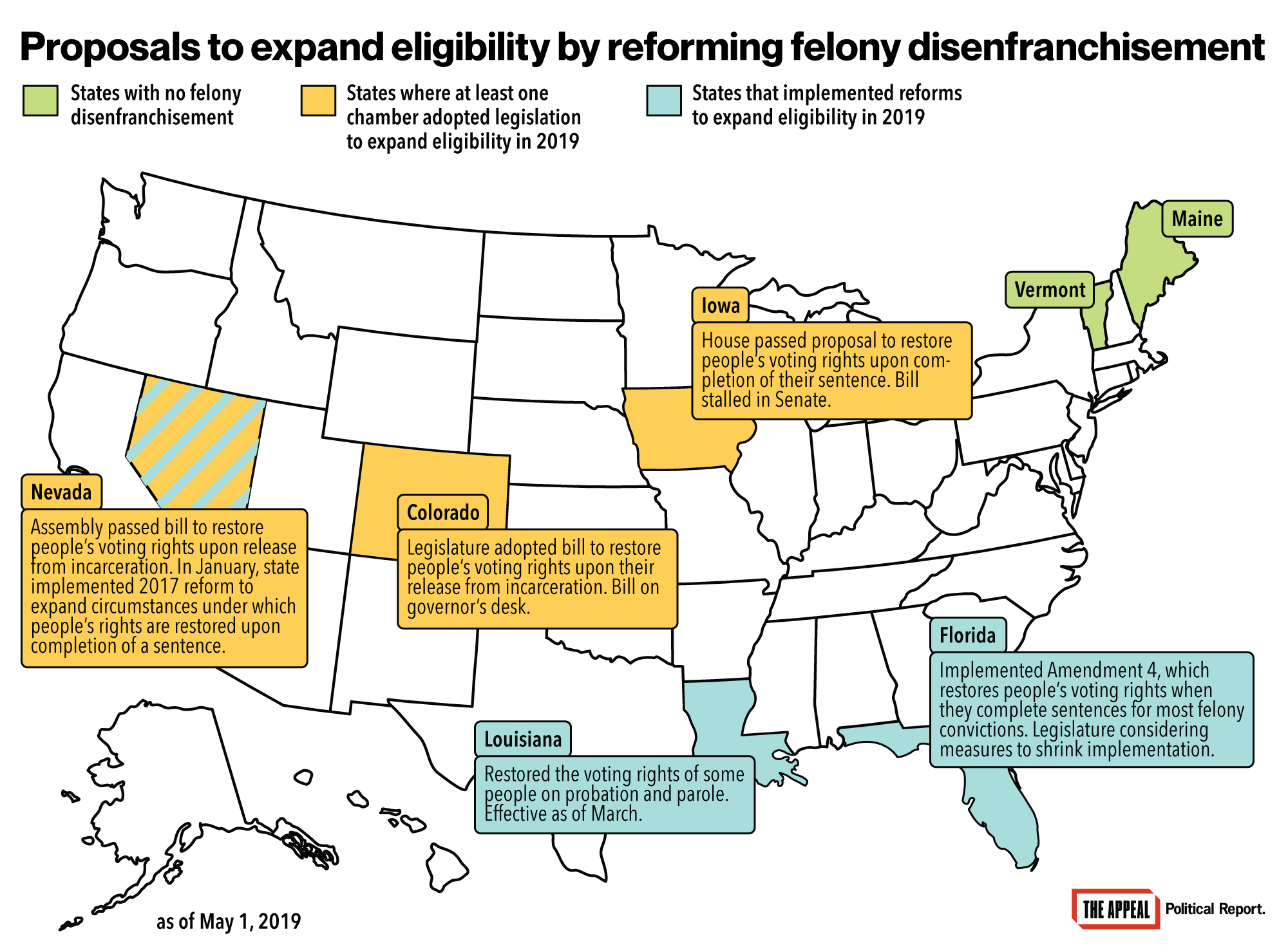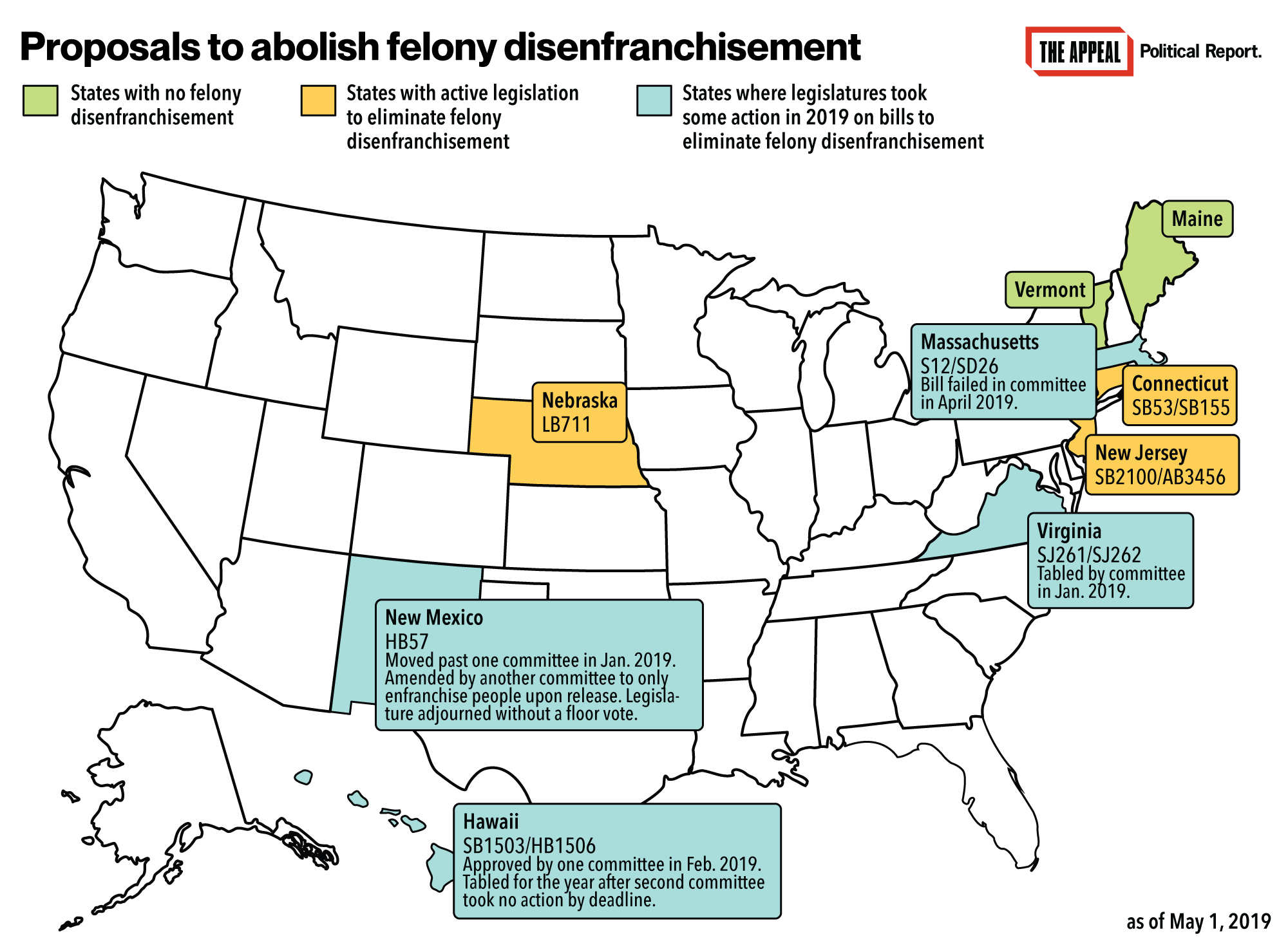Debate on Felony Disenfranchisement Is Already Here in State Legislatures Around the Country
Daniel Nichanian | May 1, 2019
This article originally appeared on The Appeal, which hosted The Political Report project.
Voting rights may be a growing issue in the presidential election, but the organizing to reform or abolish felony disenfranchisement has taken off at the state level.
Some states, most notably Colorado and Nevada, are moving to enfranchise everyone upon their release from incarceration, a step that would itself significantly expand and simplify eligibility. But other legislatures have killed even such proposals. In the states with the most restrictive rules, proposals modeled after Florida’s Amendment 4 to restore people’s rights once they complete their sentence generated attention but have fallen short so far.
Moreover, in two states this year legislative committees advanced proposals to provide voting rights to all voting-age citizens. Such proposals, which have also been introduced in other states, have been unsuccessful so far. But they have laid out a new template for ambitious reform. Earlier efforts focused on shrinking disenfranchisement rather than eliminating it altogether.
The Appeal: Political Report took a look at the landscape of reform around the country.


Colorado is one signature away from expanding voting rights and scaling back disenfranchisement.
The state disenfranchises individuals convicted of a felony while they are incarcerated and while they are on parole. House Bill 1266, introduced by Representative Leslie Herod and Senator Stephen Fenberg, would remove the latter restriction. It would provide that people be able to exercise their right to vote upon release from incarceration. More than 9,000 individuals who are on parole would be affected. “Parolees are hardworking individuals who pay taxes, take care of their families, contribute to their communities,” Herod told me in a written message through her spokesperson, “and it’s past time we allow them to fully participate in our democracy by voting.”
The legislation passed both legislative chambers, and is now on Democratic Governor Jared Polis’s desk. If Polis signs it into law, Colorado would become the 15th state to restore people’s voting rights immediately upon release from incarceration. (That’s in addition to Maine and Vermont, which have no felony disenfranchisement, including while one is incarcerated.)
This list, which includes Ohio and Indiana but not bluer states such as California or Washington, has expanded by just one state since 2006. But it could gain multiple new members this year.
The Nevada Assembly adopted a similar bill last week to restore voting rights upon release from incarceration, sending it to the Senate. This reform would get to the same point as Colorado’s through a bigger jump since Nevada currently has some of the country’s harshest laws. It is one of 12 states where people remain disenfranchised after completing their sentences. A reform that took effect this year scaled back the permanent nature of disenfranchisement, as I wrote in December, but did not abolish it.
Neither Colorado nor Nevada’s bills would abolish disenfranchisement; they would leave people unable to vote while incarcerated for felony convictions. I asked Herod what motivated the choice of championing legislation that would enfranchise people on parole specifically. “Abolishing disenfranchisement entirely will likely require amending the state constitution, a difficult process that needs a vote of the people to succeed,” she answered in writing through her spokesperson. But she called “restoring parolees’ voting rights” an “important first step,” and stated that “we need to consider restoring voting rights to those incarcerated. Felon disenfranchisement laws disproportionately affect people of color and since the civil war have been used to erode our political power… If anyone should be voting, it’s those who have been most affected by our laws.”
Other legislatures have proved less receptive so far to proposals to expand voter eligibility.
- Constitutional amendments that would enable people to vote when they complete their sentences derailed in Iowa and Mississippi. Iowa and Mississippi have some of the country’s most expansive lifetime bans on voting.
- Florida significantly expanded eligibility this year. As a result of Amendment 4’s win in November, approximately 1.4 million people who had completed their sentences became eligible to register in January, and the state has even held some local elections since. But the state legislature is poised to restrict the reform’s implementation this week, and again disenfranchise some of these individuals. Kira Lerner reported on the latest from Florida in The Appeal on Wednesday.
- Democratic legislatures defeated legislation to enfranchise people immediately upon their release in New Mexico and in Washington.
- Hawaii and Massachusetts already restore people’s rights upon their release. They were considering proposals to entirely abolish disenfranchisement and to allow people with felony convictions to vote from prison. Both proposals failed this year.
I reported on Hawaii’s abolition legislation in March, but Massachusetts’s proposed reform (S.12) failed just last week, when the Joint Committee on Election Laws effectively voted to table it.


The committee vote was not public. Only four of its 17 members answered my multiple requests for comment about how they voted.
All those who replied told me that they voted to advance the reform. They are state Representatives Russell Holmes and Lindsay Sabadosa, and state Senators Sonia Chang-Díaz and James Eldridge. All four are Democrats, but so are 14 of the committee’s 17 members. “It’s very easy for prisoners to lose hope and their connection to society, and restoring the right to vote would provide an enhanced capacity to stay connected,” Elridge told me.
State organizers have taken issue with the secrecy of this process. “When legislators vote behind closed doors to continue to a racist history of disenfranchisement, with no public record of how they voted for their constituents, that’s a fundamental failure of democracy,” Jonathan Cohn, an organizer with Progressive Mass, an advocacy group that supported the proposal, told me in a written message. He added that the lack of public votes is “a systemic problem for activists in Massachusetts because bills can be killed with everyone having ‘clean hands.’”
The Emancipation Initiative and the Harvard Prison Divestment Campaign, two state-based groups, are planning a citizen-initiated ballot initiative to abolish felony disenfranchisement in Massachusetts. They launched this effort at an April 1 event in Boston. U.S. Representative Ayanna Pressley, who represents the district where the event was held, told me at the time in a written message through a spokesperson that “it’s time to have this conversation” and to ask whether suffrage “should… be a fundamental human right.” Pressley noted that Massachusetts only disenfranchised prisoners in 2000 in “reaction to organizing efforts on the inside in prisons in my district.”
Rachel Corey, an organizer with the Emancipation Initiative, confirmed that a ballot initiative remained an objective for her group in the wake of the legislative setback. “The legislators were the people who got us into this mess and stripped people of their right to vote less than 20 years ago,” she said. “The ultimate decision makers on a constitutional amendment are the citizens of the state, so we also want to raise awareness about the issue through signature collection.” The group plans to gather signatures in the fall.
Multiple bills to expand eligibility are still pending in California, Connecticut (Senate Bills 25, 53, and 155), Minnesota (House File 40), Nebraska (Legislative Bills 83 and 91) and New Jersey (SB 2100, Assembly Bill 3456). None has received a floor vote, though some have received a hearing, and some have leadership support.


